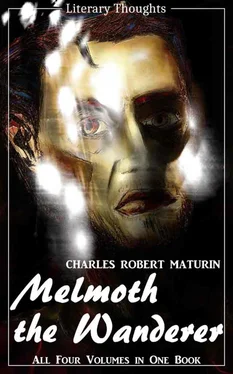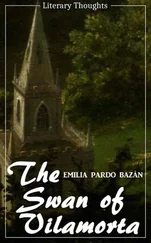Melmoth the Wanderer by Charles Robert Maturin
Literary Thoughts Edition presents
Melmoth the Wanderer,
by Charles Robert Maturin
Transscribed and Published by Jacson Keating (editor)
For more titles of the Literary Thoughts edition, visit our website: www.literarythoughts.com
All rights reserved. No part of this edition may be reproduced, stored in retrieval system, copied in any form or by any means, electronic, mechanical, photocopying, recording or otherwise transmitted without written permission from the publisher. You must not circulate this book in any format. For permission to reproduce any one part of this edition, contact us on our website: www.literarythoughts.com.
This edition is licensed for your personal enjoyment only. It may not be resold or given away to other people. If you would like to share this book with another person, please purchase an additional copy for each recipient. If you’re reading this book and did not purchase it, or it was not purchased for your use only, then please return to Amazon and purchase your own copy of the ISBN edition available below. Thank you for respecting the efforts of this edition.
TO THE
MOST NOBLE
THE
MARCHIONESS OF ABERCORN,
This Romance
Is, by her Ladyship’s permission,
Respectfully inscribed by
THE AUTHOR.
The hint of this Romance (or Tale) was taken from a passage in one of my Sermons, which (as it is to be presumed very few have read) I shall here take the liberty to quote. The passage is this.
“At this moment is there one of us present, however we may have departed from the Lord, disobeyed his will, and disregarded his word—is there one of us who would, at this moment, accept all that man could bestow, or earth afford, to resign the hope of his salvation?—No, there is not one—not such a fool on earth, were the enemy of mankind to traverse it with the offer!”
This passage suggested the idea of “Melmoth the Wanderer.” The Reader will find that idea developed in the following pages, with what power or success he is to decide.
The “Spaniard’s Tale” has been censured by a friend to whom I read it, as containing too much attempt at the revivification of the horrors of Radcliffe-Romance, of the persecutions of convents, and the terrors of the Inquisition.
I defended myself, by trying to point out to my friend, that I had made the misery of conventual life depend less on the startling adventures one meets with in romances, than on that irritating series of petty torments which constitutes the misery of life in general, and which, amid the tideless stagnation of monastic existence, solitude gives its inmates leisure to invent, and power combined with malignity, the full disposition to practise. I trust this defence will operate more on the conviction of the Reader, than it did on that of my friend.
For the rest of the Romance, there are some parts of it which I have borrowed from real life.
The story of John Sandal and Elinor Mortimer is founded in fact.
The original from which the Wife of Walberg is imperfectly sketched is a living woman, and long may she live.
I cannot again appear before the public in so unseemly a character as that of a writer of romances, without regretting the necessity that compels me to it. Did my profession furnish me with the means of subsistence, I should hold myself culpable indeed in having recourse to any other, but—am I allowed the choice?
Dublin,
31st August 1820.
MELMOTH.
Alive again? Then show me where he is;
I’ll give a thousand pounds to look upon him.
Shakespeare.
In the autumn of 1816, John Melmoth, a student in Trinity College, Dublin, quitted it to attend a dying uncle on whom his hopes for independence chiefly rested. John was the orphan son of a younger brother, whose small property scarce could pay John’s college expences; but the uncle was rich, unmarried, and old; and John, from his infancy, had been brought up to look on him with that mingled sensation of awe, and of the wish, without the means to conciliate, (that sensation at once attractive and repulsive), with which we regard a being who (as nurse, domestic, and parent have tutored us to believe) holds the very threads of our existence in his hands, and may prolong or snap them when he pleases.
On receiving this summons, John set immediately out to attend his uncle.
The beauty of the country through which he travelled (it was the county Wicklow) could not prevent his mind from dwelling on many painful thoughts, some borrowed from the past, and more from the future. His uncle’s caprice and moroseness,—the strange reports concerning the cause of the secluded life he had led for many years,—his own dependent state,—fell like blows fast and heavy on his mind. He roused himself to repel them,—sat up in the mail, in which he was a solitary passenger,—looked out on the prospect,—consulted his watch;—then he thought they receded for a moment,—but there was nothing to fill their place, and he was forced to invite them back for company. When the mind is thus active in calling over invaders, no wonder the conquest is soon completed. As the carriage drew near the Lodge, (the name of old Melmoth’s seat), John’s heart grew heavier every moment.
The recollection of this awful uncle from infancy,—when he was never permitted to approach him without innumerable lectures,—not to be troublesome,—not to go too near his uncle,—not to ask him any questions,—on no account to disturb the inviolable arrangement of his snuff-box, hand-bell, and spectacles, nor to suffer the glittering of the gold-headed cane to tempt him to the mortal sin of handling it,—and, finally, to pilot himself aright through his perilous course in and out of the apartment without striking against the piles of books, globes, old newspapers, wig-blocks, tobacco-pipes, and snuff-cannisters, not to mention certain hidden rocks of rat-traps and mouldy books beneath the chairs,—together with the final reverential bow at the door, which was to be closed with cautious gentleness, and the stairs to be descended as if he were “shod with felt.”—This recollection was carried on to his school-boy years, when at Christmas and Easter, the ragged poney, the jest of the school, was dispatched to bring the reluctant visitor to the Lodge,—where his pastime was to sit vis-a-vis to his uncle, without speaking or moving, till the pair resembled Don Raymond and the ghost of Beatrice in the Monk,—then watching him as he picked the bones of lean mutton out of his mess of weak broth, the latter of which he handed to his nephew with a needless caution not to “take more than he liked,”—then hurried to bed by day-light, even in winter, to save the expence of an inch of candle, where he lay awake and restless from hunger, till his uncle’s retiring at eight o’clock gave signal to the governante of the meagre household to steal up to him with some fragments of her own scanty meal, administering between every mouthful a whispered caution not to tell his uncle. Then his college life, passed in an attic in the second square, uncheered by an invitation to the country; the gloomy summer wasted in walking up and down the deserted streets, as his uncle would not defray the expences of his journey;—the only intimation of his existence, received in quarterly epistles, containing, with the scanty but punctual remittance, complaints of the expences of his education, cautions against extravagance, and lamentations for the failure of tenants and the fall of the value of lands. All these recollections came over him, and along with them the remembrance of that last scene, where his dependence on his uncle was impressed on him by the dying lips of his father.
Читать дальше












